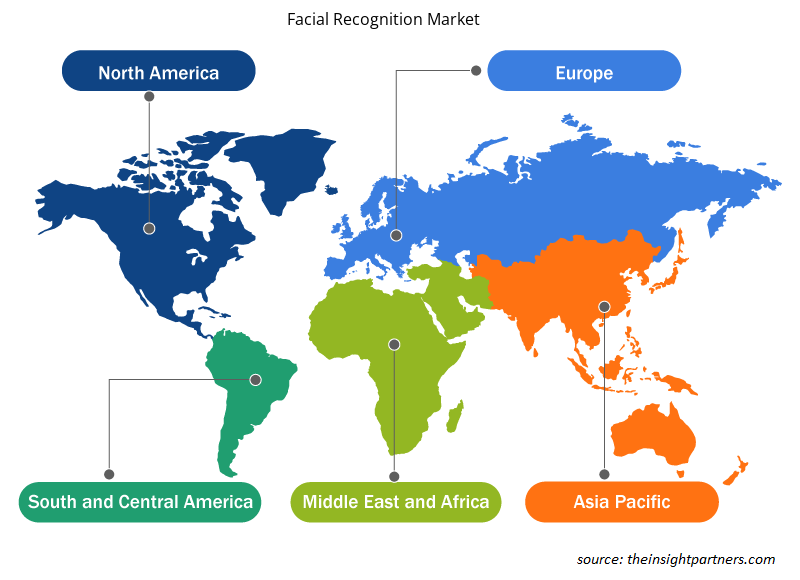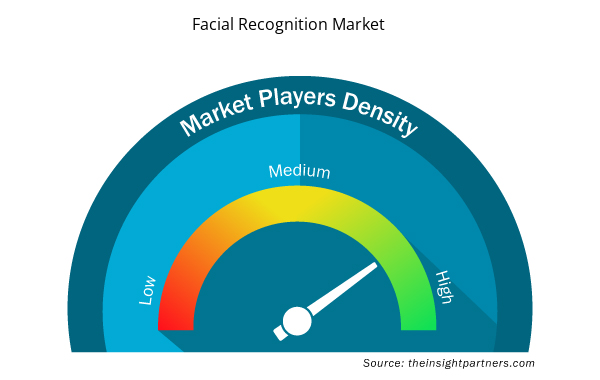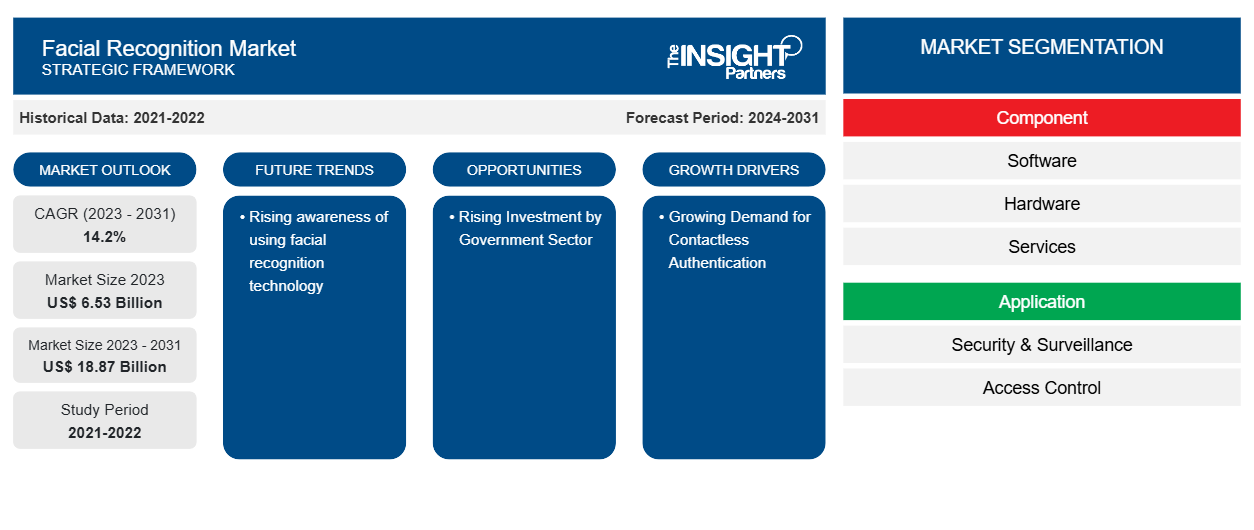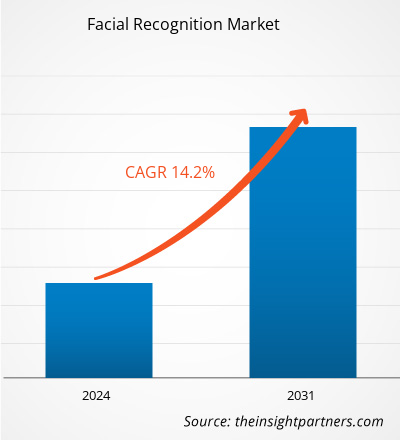Si prevede che la dimensione del mercato del riconoscimento facciale raggiungerà i 18,87 miliardi di dollari entro il 2031, rispetto ai 6,53 miliardi di dollari del 2023. Si prevede che il mercato registrerà un CAGR del 14,2% nel periodo 2023-2031.È probabile che la crescente consapevolezza dell'uso della tecnologia di riconoscimento facciale rimanga una tendenza fondamentale nel mercato.
Analisi di mercato del riconoscimento facciale
La crescente richiesta di sistemi di videosorveglianza efficaci sta facendo aumentare la domanda di tecnologie di riconoscimento facciale. La tecnologia di riconoscimento facciale viene adottata da settori quali sicurezza e forze dell'ordine, sanità, commercio al dettaglio e trasporti per migliorare la sicurezza e la protezione.
Panoramica del mercato del riconoscimento facciale
Il riconoscimento facciale è un tipo di software biometrico che utilizza i tratti facciali di una persona per verificarne l'identificazione. Il riconoscimento facciale è un metodo tipico utilizzato nei sistemi di sicurezza per identificare persone o utenti specifici. Una delle applicazioni più frequenti del riconoscimento facciale è lo sblocco dei telefoni cellulari. La tecnica è utilizzata anche nelle forze dell'ordine, nel monitoraggio video e nello screening dei passeggeri. Il riconoscimento facciale mappa matematicamente le caratteristiche facciali di una persona e memorizza i risultati come impronta facciale. Per convalidare l'identificazione di un individuo, il programma confronta un video distinto o un'immagine digitale con un database di impronte facciali memorizzate utilizzando tecniche di apprendimento profondo.
Personalizza questo report in base alle tue esigenze
Riceverai la personalizzazione gratuita di qualsiasi report, comprese parti di questo report, o analisi a livello nazionale, pacchetto dati Excel, oltre a usufruire di grandi offerte e sconti per start-up e università
- Scopri le principali tendenze di mercato in questo rapporto.Questo campione GRATUITO includerà analisi di dati che spaziano dalle tendenze di mercato alle stime e alle previsioni.
Driver e opportunità del mercato del riconoscimento facciale
La crescente domanda di autenticazione contactless favorirà il mercato
La crescente necessità di tecniche di autenticazione contactless, insieme alla disponibilità di telecamere ad alta risoluzione e al crescente utilizzo di smartphone dotati di capacità di riconoscimento facciale, sta spingendo in avanti il settore del riconoscimento facciale. Questa tecnologia ha impieghi in una varietà di settori, tra cui sorveglianza, banche, aeroporti e controllo degli accessi . Si stima che il mercato creerà grandi entrate e continuerà a crescere negli anni a venire.
Aumento degli investimenti nel settore pubblico
Il segmento governativo è costituito da varie strutture governative, strutture di difesa, municipalità, stazioni di servizio e altro. A causa della crescente enfasi sulla sicurezza nazionale, i governi di tutto il mondo stanno investendo in modo significativo in soluzioni di sicurezza avanzate come i sistemi di riconoscimento facciale. Inoltre, la crescente enfasi sullo sviluppo di città intelligenti è tra gli altri fattori che contribuiscono all'adozione di sistemi di riconoscimento facciale per applicazioni di sicurezza e sorveglianza avanzate, che guidano la crescita del mercato del riconoscimento facciale.
Analisi della segmentazione del rapporto di mercato sul riconoscimento facciale
I segmenti chiave che hanno contribuito alla derivazione dell'analisi di mercato del riconoscimento facciale sono i componenti, le applicazioni e il settore verticale.
- In base al componente, il mercato è segmentato in software, hardware e servizi. Il segmento hardware ha detenuto una quota di mercato significativa nel 2023.
- In base all'applicazione, il mercato è segmentato in sicurezza e sorveglianza, controllo degli accessi e altri. Il segmento sicurezza e sorveglianza ha detenuto una quota di mercato maggiore nel 2023.
- In base alla verticale, il mercato è segmentato in BFSI, vendita al dettaglio ed e-commerce, governo, sanità, istruzione, automotive e trasporti e altri. Il segmento BFSI ha detenuto la quota maggiore del mercato nel 2023.
Analisi della quota di mercato del riconoscimento facciale per area geografica
L'ambito geografico del rapporto sul mercato del riconoscimento facciale è suddiviso principalmente in cinque regioni: Nord America, Asia Pacifico, Europa, Medio Oriente e Africa, Sud e Centro America.
Il Nord America ha dominato il mercato nel 2023. Pertanto, si prevede che qualsiasi impatto sulla crescita delle industrie influirà negativamente sulla crescita economica della regione. Nonostante diverse normative statali e locali che regolano la tecnologia di riconoscimento facciale negli Stati Uniti, persistono conflitti imminenti. Si prevede che il riconoscimento facciale aumenterà in modo significativo nei prossimi anni a causa dei maggiori investimenti ed entusiasmo delle aziende nell'abbracciarlo. Allo stesso tempo, i legislatori statunitensi e i gruppi per la privacy stanno esprimendo preoccupazioni sui potenziali effetti sociali della tecnologia e sostenendo una maggiore regolamentazione.
Approfondimenti regionali sul mercato del riconoscimento facciale
Le tendenze regionali e i fattori che influenzano il mercato del riconoscimento facciale durante il periodo di previsione sono stati ampiamente spiegati dagli analisti di Insight Partners. Questa sezione discute anche i segmenti e la geografia del mercato del riconoscimento facciale in Nord America, Europa, Asia Pacifico, Medio Oriente e Africa e Sud e Centro America.

- Ottieni i dati specifici regionali per il mercato del riconoscimento facciale
Ambito del rapporto di mercato sul riconoscimento facciale
| Attributo del report | Dettagli |
|---|---|
| Dimensioni del mercato nel 2023 | 6,53 miliardi di dollari USA |
| Dimensioni del mercato entro il 2031 | 18,87 miliardi di dollari USA |
| CAGR globale (2023-2031) | 14,2% |
| Dati storici | 2021-2022 |
| Periodo di previsione | 2024-2031 |
| Segmenti coperti | Per componente
|
| Regioni e Paesi coperti | America del Nord
|
| Leader di mercato e profili aziendali chiave |
|
Densità degli attori del mercato del riconoscimento facciale: comprendere il suo impatto sulle dinamiche aziendali
Il mercato del riconoscimento facciale sta crescendo rapidamente, spinto dalla crescente domanda degli utenti finali dovuta a fattori quali l'evoluzione delle preferenze dei consumatori, i progressi tecnologici e una maggiore consapevolezza dei vantaggi del prodotto. Con l'aumento della domanda, le aziende stanno ampliando le loro offerte, innovando per soddisfare le esigenze dei consumatori e capitalizzando sulle tendenze emergenti, il che alimenta ulteriormente la crescita del mercato.
La densità degli operatori di mercato si riferisce alla distribuzione di aziende o società che operano in un particolare mercato o settore. Indica quanti concorrenti (operatori di mercato) sono presenti in un dato spazio di mercato in relazione alle sue dimensioni o al valore di mercato totale.
Le principali aziende che operano nel mercato del riconoscimento facciale sono:
- Tecnologia5
- IDEMIA
- Consapevole Inc.
- Cognitec Sistemi GmbH
- Società Ayonix
- Fujitsu Limited
Disclaimer : le aziende elencate sopra non sono classificate secondo un ordine particolare.

- Ottieni una panoramica dei principali attori del mercato del riconoscimento facciale
Notizie e sviluppi recenti sul mercato del riconoscimento facciale
Il mercato del riconoscimento facciale viene valutato raccogliendo dati qualitativi e quantitativi dopo la ricerca primaria e secondaria, che include importanti pubblicazioni aziendali, dati associativi e database. Di seguito sono elencati alcuni degli sviluppi nel mercato del riconoscimento facciale:
- IDEMIA ha presentato VisionPass SP, la sua ultima soluzione di riconoscimento facciale per il controllo degli accessi. IDEMIA ha arricchito la sua offerta di prodotti con VisionPass SP, un terminale elegante e compatto con un design ecologico che fornisce risultati di corrispondenza accurati ed equi. (Fonte: IDEMIA, Comunicato stampa, gennaio 2024)
- BAXE e Haventec hanno stretto una partnership con IDEMIA per lanciare il primo ecosistema blockchain che utilizza una soluzione di autenticazione facciale per l'identificazione. (Fonte: BAXE, comunicato stampa, gennaio 2022)
Copertura e risultati del rapporto sul mercato del riconoscimento facciale
Il rapporto "Dimensioni e previsioni del mercato del riconoscimento facciale (2021-2031)" fornisce un'analisi dettagliata del mercato che copre le seguenti aree:
- Dimensioni e previsioni del mercato del riconoscimento facciale a livello globale, regionale e nazionale per tutti i segmenti di mercato chiave coperti dall'ambito
- Tendenze del mercato del riconoscimento facciale e dinamiche di mercato come driver, restrizioni e opportunità chiave
- Analisi dettagliata delle cinque forze PEST/Porter e SWOT
- Analisi di mercato del riconoscimento facciale che copre le principali tendenze del mercato, il quadro globale e regionale, i principali attori, le normative e i recenti sviluppi del mercato
- Analisi del panorama industriale e della concorrenza che copre la concentrazione del mercato, l'analisi della mappa di calore, i principali attori e gli sviluppi recenti per il mercato del riconoscimento facciale
- Profili aziendali dettagliati
- Analisi storica (2 anni), anno base, previsione (7 anni) con CAGR
- Analisi PEST e SWOT
- Valore/volume delle dimensioni del mercato - Globale, regionale, nazionale
- Industria e panorama competitivo
- Set di dati Excel



Report Coverage
Revenue forecast, Company Analysis, Industry landscape, Growth factors, and Trends

Segment Covered
This text is related
to segments covered.

Regional Scope
North America, Europe, Asia Pacific, Middle East & Africa, South & Central America

Country Scope
This text is related
to country scope.
Domande frequenti
North America dominated the facial recognition market in 2023.
The growing requirement for effective video surveillance systems is driving up demand for facial recognition technologies. Facial recognition technology is being adopted by industries such as security and law enforcement, healthcare, retail, and transportation to improve security and safety.
The rising awareness of using facial recognition technology is likely to remain a key trend in the market.
Tech5, IDEMIA, Aware Inc., Cognitec Systems GmbH, and Ayonix Corporation are among the leading facial recognition market.
The estimated value of the facial recognition market is expected to reach US$ 18.87 billion by 2031.
The market is expected to grow at a CAGR of 14.2% over the forecast period.
Trends and growth analysis reports related to Technology, Media and Telecommunications : READ MORE..
The Insight Partners performs research in 4 major stages: Data Collection & Secondary Research, Primary Research, Data Analysis and Data Triangulation & Final Review.
- Data Collection and Secondary Research:
As a market research and consulting firm operating from a decade, we have published and advised several client across the globe. First step for any study will start with an assessment of currently available data and insights from existing reports. Further, historical and current market information is collected from Investor Presentations, Annual Reports, SEC Filings, etc., and other information related to company’s performance and market positioning are gathered from Paid Databases (Factiva, Hoovers, and Reuters) and various other publications available in public domain.
Several associations trade associates, technical forums, institutes, societies and organization are accessed to gain technical as well as market related insights through their publications such as research papers, blogs and press releases related to the studies are referred to get cues about the market. Further, white papers, journals, magazines, and other news articles published in last 3 years are scrutinized and analyzed to understand the current market trends.
- Primary Research:
The primarily interview analysis comprise of data obtained from industry participants interview and answers to survey questions gathered by in-house primary team.
For primary research, interviews are conducted with industry experts/CEOs/Marketing Managers/VPs/Subject Matter Experts from both demand and supply side to get a 360-degree view of the market. The primary team conducts several interviews based on the complexity of the markets to understand the various market trends and dynamics which makes research more credible and precise.
A typical research interview fulfils the following functions:
- Provides first-hand information on the market size, market trends, growth trends, competitive landscape, and outlook
- Validates and strengthens in-house secondary research findings
- Develops the analysis team’s expertise and market understanding
Primary research involves email interactions and telephone interviews for each market, category, segment, and sub-segment across geographies. The participants who typically take part in such a process include, but are not limited to:
- Industry participants: VPs, business development managers, market intelligence managers and national sales managers
- Outside experts: Valuation experts, research analysts and key opinion leaders specializing in the electronics and semiconductor industry.
Below is the breakup of our primary respondents by company, designation, and region:

Once we receive the confirmation from primary research sources or primary respondents, we finalize the base year market estimation and forecast the data as per the macroeconomic and microeconomic factors assessed during data collection.
- Data Analysis:
Once data is validated through both secondary as well as primary respondents, we finalize the market estimations by hypothesis formulation and factor analysis at regional and country level.
- Macro-Economic Factor Analysis:
We analyse macroeconomic indicators such the gross domestic product (GDP), increase in the demand for goods and services across industries, technological advancement, regional economic growth, governmental policies, the influence of COVID-19, PEST analysis, and other aspects. This analysis aids in setting benchmarks for various nations/regions and approximating market splits. Additionally, the general trend of the aforementioned components aid in determining the market's development possibilities.
- Country Level Data:
Various factors that are especially aligned to the country are taken into account to determine the market size for a certain area and country, including the presence of vendors, such as headquarters and offices, the country's GDP, demand patterns, and industry growth. To comprehend the market dynamics for the nation, a number of growth variables, inhibitors, application areas, and current market trends are researched. The aforementioned elements aid in determining the country's overall market's growth potential.
- Company Profile:
The “Table of Contents” is formulated by listing and analyzing more than 25 - 30 companies operating in the market ecosystem across geographies. However, we profile only 10 companies as a standard practice in our syndicate reports. These 10 companies comprise leading, emerging, and regional players. Nonetheless, our analysis is not restricted to the 10 listed companies, we also analyze other companies present in the market to develop a holistic view and understand the prevailing trends. The “Company Profiles” section in the report covers key facts, business description, products & services, financial information, SWOT analysis, and key developments. The financial information presented is extracted from the annual reports and official documents of the publicly listed companies. Upon collecting the information for the sections of respective companies, we verify them via various primary sources and then compile the data in respective company profiles. The company level information helps us in deriving the base number as well as in forecasting the market size.
- Developing Base Number:
Aggregation of sales statistics (2020-2022) and macro-economic factor, and other secondary and primary research insights are utilized to arrive at base number and related market shares for 2022. The data gaps are identified in this step and relevant market data is analyzed, collected from paid primary interviews or databases. On finalizing the base year market size, forecasts are developed on the basis of macro-economic, industry and market growth factors and company level analysis.
- Data Triangulation and Final Review:
The market findings and base year market size calculations are validated from supply as well as demand side. Demand side validations are based on macro-economic factor analysis and benchmarks for respective regions and countries. In case of supply side validations, revenues of major companies are estimated (in case not available) based on industry benchmark, approximate number of employees, product portfolio, and primary interviews revenues are gathered. Further revenue from target product/service segment is assessed to avoid overshooting of market statistics. In case of heavy deviations between supply and demand side values, all thes steps are repeated to achieve synchronization.
We follow an iterative model, wherein we share our research findings with Subject Matter Experts (SME’s) and Key Opinion Leaders (KOLs) until consensus view of the market is not formulated – this model negates any drastic deviation in the opinions of experts. Only validated and universally acceptable research findings are quoted in our reports.
We have important check points that we use to validate our research findings – which we call – data triangulation, where we validate the information, we generate from secondary sources with primary interviews and then we re-validate with our internal data bases and Subject matter experts. This comprehensive model enables us to deliver high quality, reliable data in shortest possible time.


 Ottieni un campione gratuito per questo repot
Ottieni un campione gratuito per questo repot